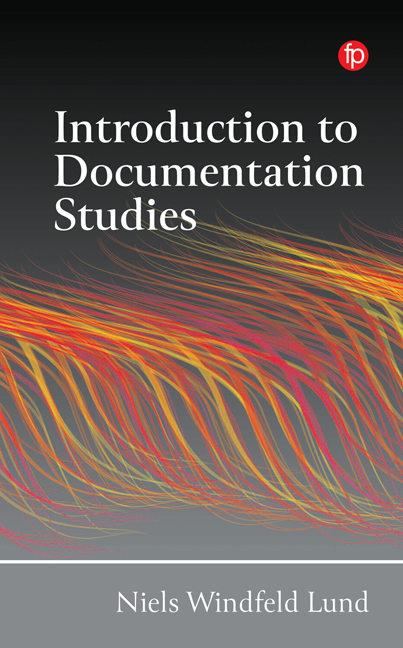 Introduction to Documentation Studies
Introduction to Documentation Studies Epilogue: Society in a Complementary Documentation Perspective
Published online by Cambridge University Press: 28 March 2024
Summary
A complementary world view
When we read ‘Indian Camp’ by Hemingway, or listen to Martin Luther King Jr’s speech ‘I have a dream’, we are drawn into two different mental universes, providing two different conceptual configurations, created by an artist and a politician, giving us a possibility to imagine two different worlds and think about the world and life. We are also given a well-written story and a well-written speech, created by two skilled craftsmen in fiction and rhetoric (Lubbock, 1957). Last but not least, we are also introduced to two documents, created in a special situation in the societies of the 1920s and 1960s. All of this provides us a complementary understanding of both the arts and politics.
If we today, in the 21st century, approach our life and society with a complementary world view, we may be able to better understand what is going on in the world and how we can make a good life.
In the professional world of document managers, critical discussions about which documents should be preserved and how they should be indexed could be framed within a complementary discussion on the role of documents in society.
The role of crafts and skills in the 21st century
One might immediately think that craftsmanship is less important today in our digital society. The fact is that it is just as, if not even more, important in our society. To be well prepared for the future, young people need to be skilled both in classical analogue and modern digital craftsmanship, writing by hand with a pen alongside programming.
When the Document Academy was founded in 2001, we decided to use the concept of Academy so as to include the fine arts together with the sciences. If it is possible not only to bring humanities, natural sciences/engineering and social sciences together, but also to bring artists and scientists together it will provide an opportunity to develop programs in artistic craftsmanship based on systematic research on artistic craftsmanship, in fact on artistic documentation.
The condition of contingency
We do not talk about contingency in our everyday life. Nevertheless, it is a mostly hidden condition in our life (Heller, 1989).
Information
- Type
- Chapter
- Information
- Introduction to Documentation StudiesComplementary Studies of Documentation, Communication and Information, pp. 151 - 152Publisher: FacetPrint publication year: 2024